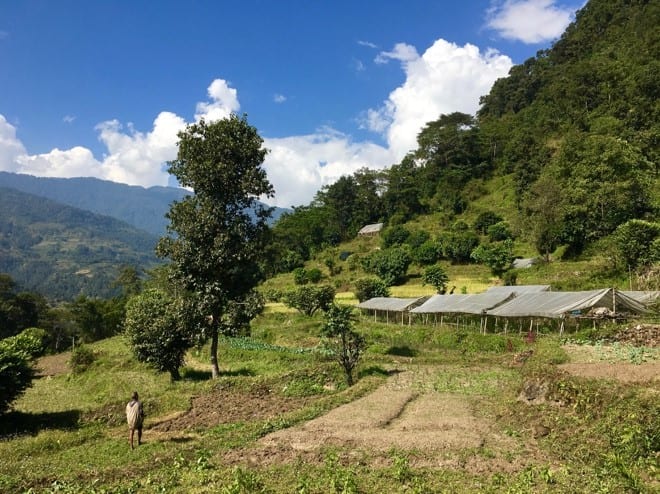The Vision:
Three dedicated individuals, Julian Hungerbuehler, Emma Warren with the landowner, Tulsi Giri have designed and are building a sustainable, rammed earth style community building on SAATHI BIO FARM (translation: Friends Organic Farm). The small community farm lies 20km north of Pokhara next to the village Humdi Lampata, above a beautiful valley with views of the Himalayan peaks. The hope is to show by example and through education, that sustainable tourism in a rural community fits well with the overall goals of sustainable agriculture and an entirely ecological lifestyle, thus acting as a pioneer for organic living.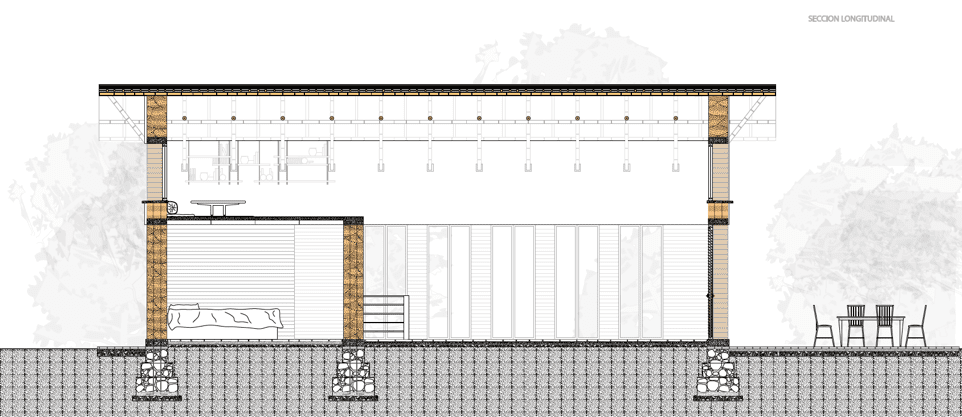
The specific goal of this project is to create a space for an exchange between local farmers, eco-tourists, agri-tourists and specialists, all visiting or working at SAATHI BIO FARM. In this way, the village can profit from both tourism (through homestays), and learning organic farming 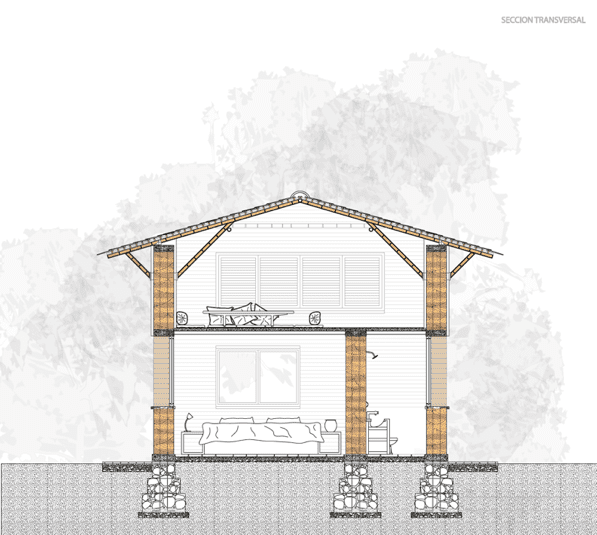 techniques to keep producing high quality products. In turn, volunteers and young entrepreneurs will learn about organic, sustainable farming from permaculture specialists visiting and working for the farm. It is our hope to also make farming more profitable for the indigenous farmers through these kinds of education and community projects.
techniques to keep producing high quality products. In turn, volunteers and young entrepreneurs will learn about organic, sustainable farming from permaculture specialists visiting and working for the farm. It is our hope to also make farming more profitable for the indigenous farmers through these kinds of education and community projects.
Sustainability is our driving force. We live in a world with so much waste and a lack of education, that sustainable living is key for our future. Nepal is a country greatly impacted by tourism. It is one of the fastest growing industries making it essential to promote sustainability and innovation, to make sure that with the growing number of tourists also brings a better quality of life for everyone, as well as the natural environment. By providing the building as a meeting and living space, we are supporting the ongoing educational arm of SAATHI BIO FARM. We chose the construction technique of rammed earth, because it ties in so well with our brand of organic living.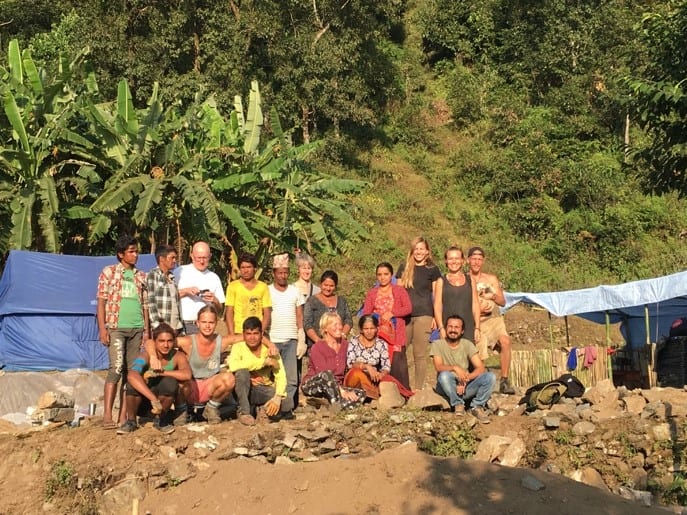
Rammed earth is a technique for constructing foundations, floors, and walls using only natural/locally sourced raw materials including earth, sand, silt, clay, and gravel. The walls are put into place using flat panels called formwork. We joined with Rammed Earth Solutions, a construction company based in Kathmandu, which practices a more modern approach of ramming, by compacting the earth with a mechanical ram instead of a human-powered pole, and by adding a small amount of cement (4-6%) to increase durability of the walls. Most of the energy used for this project goes into the transportation of materials to the site; however, after that the house will be earthquake proof and can last hundreds of years. This technique ties in with our goal of sustainability, and overall target for it to be a self-sufficient and safe building.
Where they are currently:
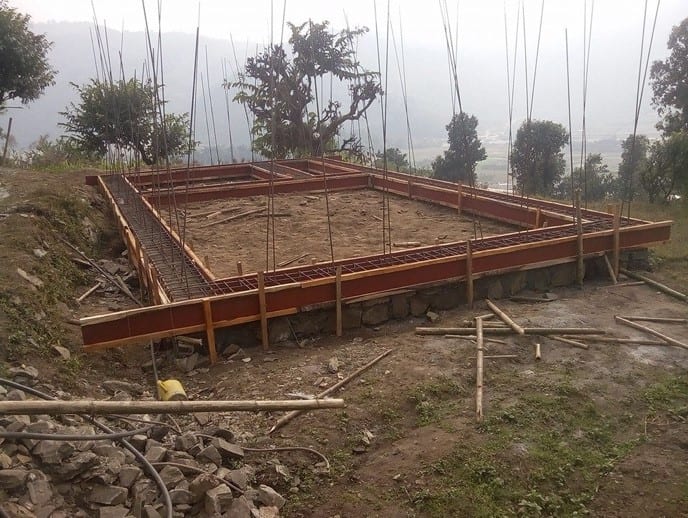 We have already begun the building process with Rammed Earth Solutions, and have completed the foundation of the building. Together with 4 volunteers and 6 Nepali crew members, we lived on the farm in our self-constructed bamboo camp through November. We do not presently have the funds to finish the building and are looking for additional funding sources and partnerships to complete the project. We need to finish the building by June, 2018.
We have already begun the building process with Rammed Earth Solutions, and have completed the foundation of the building. Together with 4 volunteers and 6 Nepali crew members, we lived on the farm in our self-constructed bamboo camp through November. We do not presently have the funds to finish the building and are looking for additional funding sources and partnerships to complete the project. We need to finish the building by June, 2018.
What we need by March 15 to accomplish this task:
We have to date raised $6,000 (which we used for the foundation). An additional $25,000 is needed to complete the project:
• The remaining required building materials/tools
• Rammed Earth consultants and professional workers
• Camp supplies for volunteers (tents, food)
• Funds for Nepali hosts who are feeding the workers and volunteers once a day
• Personal costs for project coordinators
*Detailed budget available upon request
Tax deductable donations can be made through the Generosity.com platform. Follow this link: https://www.generosity.com/community-fundraising/saathi-bio-farm-community-project
Who we are:
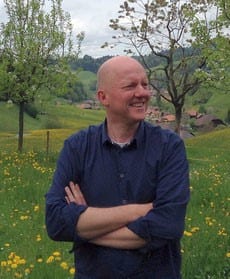



Julian Hungerbuehler (above center left), and Emma Warren (center right), are the coordinators for the funding, designing, and construction of the building. Julian is a carpenter from Switzerland with eight years’ experience in the field. Last year in Pokhara, he designed and built a prototype earth-bag round-house, with a traditional bamboo roof construction, which fostered the idea to build a similar building on the pre-existing Saathi Bio Farm, with one of the land owners and manager, Tulsi Giri (above right). Emma, from Santa Fe, NM, has a Bachelor’s degree in Environmental Studies – Sociology with a focus in Sustainable Development, and is working as the project accountant and outreach coordinator.
The project will eventually work in coordination with an organization in Pokhara called The Bazaar founded by Tulsi, which acts as Sustainable Regional Food Network, a market for many different types of high quality organic foods and locally produced items that can be exported to share Nepali goods with the world, through the network of Development Voyages.
Tulsi’s business mentor/partner, Patrick Honauer, is a social entrepreneur, from Switzerland. Involved in this field since 1993, when he started his first company. He is the founder and co-founder of: Neuhof Bachs, which is the first organic restaurant in Switzerland, and Rundumkultur, a start-up for social entrepreneurs, as well as several other start-up companies.
Rammed Earth Solutions supplied us with virtual designs for the building, professional consulting as well as with the workers from the company who specialize in each step of rammed earth construction.
We have recently aligned with the Institute of Ecotechnics, an international non-profit organization that is serving as our fiscal sponsor. Their mission is closely aligned with ours: to design, develop, and implement programs and projects conducive to furthering the discipline of Ecotechnics, which deals with the relationships between ethnosphere, technosphere, and biosphere. They are the creators of Biosphere 2, the largest laboratory for global ecology ever built, and have started many projects with an ecological and culturalogical focus, including wastewater gardens in Bali and Mexico, the Eden in Iraq project, the Vajra Hotel in Kathmandu, and October Gallery in London.
Where to find us:
For donations, we have set up a generosity.com account: Saathi Bio Farm Community Project. Any contribution is greatly appreciated, and is tax-deductible. We will be posting updates via facebook, generosity, and email, so that all contributers can keep up with the progress. Thank you so much for your time, interest and generosity!
Tax deductable donations can be made through the Generosity.com platform. Follow this link:
https://www.generosity.com/community-fundraising/saathi-bio-farm-community-project

